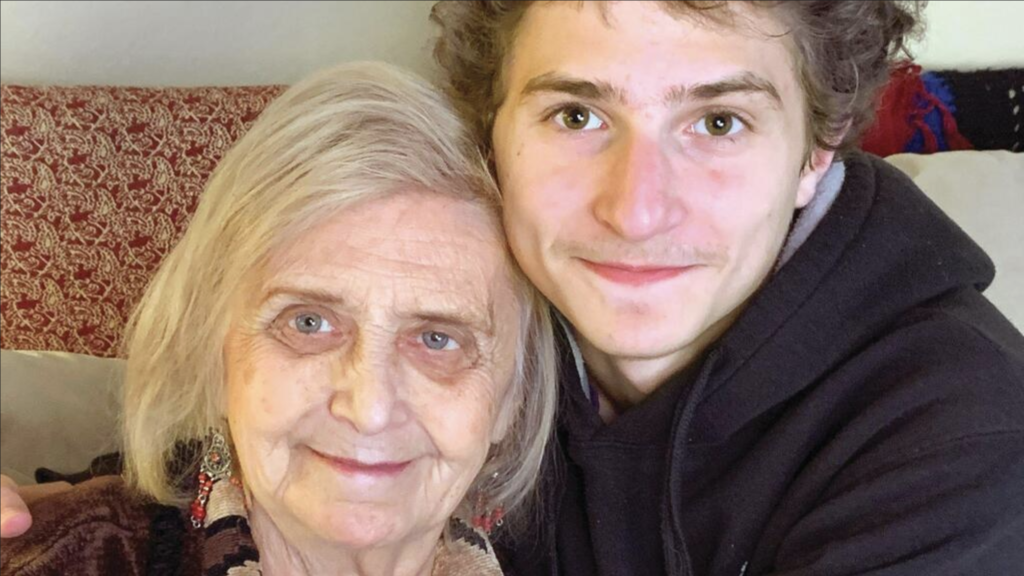Tova Friedman, 83, didn’t know anything about social media until her grandson Eran, 16, decided to open an account for her, where she would be able to share her memories of life in Auschwitz and answer question about the genocide
Ifat Manhardt|
Published: 04.28.22, 18:35

For a year and a half, between the ages of five and six, Tova Friedman didn’t have a name, being referred to only as inmate A27633.
The number was tattooed on her arm by a Jewish prisoner when she arrived at Auschwitz. “The hands of the woman who gave me this tattoo were shaking because she was so unhappy with tattooing children,” Friedman says in one of the many videos she shares on the TikTok social media app.
“She told me: Remember, that’s your name now! You have to learn it!’ Although I never went to school until then and didn’t know any numbers, I knew this was what would make the difference between life and death.”
Friedman, 83, survived the concertation camp, and went on to become a social worker who now lives in New Jersey, United States. She is a mother of four, a grandmother of eight, and an owner of a successful TikTok account with more than 360,000 followers.
In her TikTok videos, she shares with her followers the memories of the Holocaust and answers questions about the genocide.
Her grandson, Aaron-Eran Goodman, 16, opened the account for her after he noticed students in his high-school knew next to nothing about the Holocaust. “In the U.S., especially among the younger generation, there is not much awareness of the Holocaust,” Friedman told us in an interview. “Some don’t believe it happened, and others don’t understand the scale of it.”
The number was tattooed on her arm by a Jewish prisoner when she arrived at Auschwitz. “The hands of the woman who gave me this tattoo were shaking because she was so unhappy with tattooing children,” Friedman says in one of the many videos she shares on the TikTok social media app.
“She told me: Remember, that’s your name now! You have to learn it!’ Although I never went to school until then and didn’t know any numbers, I knew this was what would make the difference between life and death.”
Friedman, 83, survived the concertation camp, and went on to become a social worker who now lives in New Jersey, United States. She is a mother of four, a grandmother of eight, and an owner of a successful TikTok account with more than 360,000 followers.
In her TikTok videos, she shares with her followers the memories of the Holocaust and answers questions about the genocide.
Her grandson, Aaron-Eran Goodman, 16, opened the account for her after he noticed students in his high-school knew next to nothing about the Holocaust. “In the U.S., especially among the younger generation, there is not much awareness of the Holocaust,” Friedman told us in an interview. “Some don’t believe it happened, and others don’t understand the scale of it.”
@tovafriedman Thank you for helping us reach this crazy milestone!! 🥳🎉 @israelinusa @thetrueadventures @officialpoa @claims_conference #shoah #milestone #follow ♬ FEEL THE GROOVE - Queens Road, Fabian Graetz
Friedman was born in 1938 as Tula Grossman in the city of Tomaszów Mazowiecki, Poland. Her father was the owner of a successful tailoring business. When she was one year old, the city was occupied by the Germans, placing all Jews in a ghetto. The Germans later shot and killed her grandparents and got rid of all the elderly in the city. Her father was sent to a Dachau concentration camp, and later when she was five years old, Friedman and her mother were sent on a train to Auschwitz.
“My mother never hid the truth from me,” she says. “On the way to Auschwitz, she said this was our last stop, this is where we die. Everyone who was at Auschwitz knew it, they just didn’t know when.
“We had a stand abreast, we stood next to each other for hours without moving. One day, after more than three hours, I started to move around. An SS soldier saw me, pulled me out of the column, and started hitting me in the face, which swelled up completely,” she says.
“I was constantly hungry at the camp, and on my sixth birthday, my mother stole a piece of bread and brought it to me as a gift. The officers caught her red-handed and beat her over the head. The incident had caused her to suffer chronic headaches, and 12 years after the war ended she fell asleep on the couch at our home, and never woke up again. She was only 45.”
After the war ended, Friedman and her mother returned to their hometown. She didn’t know what happened to her father yet, but seven months later, he returned and the family was reunited. However, life in Poland was too hard to bear. Not only did her parents lose all their assets, but antisemitism was at its peak. When Friedman first went to school, the kids called her a “dirty Jew.”
When she was 12, her parents decided to emigrate to the United States. She graduated university with a degree in social work and later married Meir Friedman, a Jewish-American biochemist, who died two years ago.
Shortly before her 30th birthday, she and her husband made Aliyah to Israel, but returned to the United States a decade later. “My husband worked at Hadassah Medical Center and I worked at the Hebrew University of Jerusalem, but there was a recession and we were both fired,” she says. “In the United States, however, we were offered good jobs.”
When her grandson Eran enrolled into public high-school, he was amazed by his fellow students’ ignorance when it comes to Jews in general, and the Holocaust in particular, so he decided to open a TikTok account for his grandmother who survived the Shoah.
“It was about a year ago,” he says. “We had a history lessons at school, and our teacher had covered the entire Holocaust in two days. I was wondering how much the students could really internalize something [in such a short time]. I started asking everyone who had already studied the material questions like, ‘how many Jews were murdered in the Holocaust?’, ‘name one death camp.’ No one could give me an answer. When I asked who Hitler was, they just said, ‘a bad man.”
“My mother never hid the truth from me,” she says. “On the way to Auschwitz, she said this was our last stop, this is where we die. Everyone who was at Auschwitz knew it, they just didn’t know when.
“We had a stand abreast, we stood next to each other for hours without moving. One day, after more than three hours, I started to move around. An SS soldier saw me, pulled me out of the column, and started hitting me in the face, which swelled up completely,” she says.
“I was constantly hungry at the camp, and on my sixth birthday, my mother stole a piece of bread and brought it to me as a gift. The officers caught her red-handed and beat her over the head. The incident had caused her to suffer chronic headaches, and 12 years after the war ended she fell asleep on the couch at our home, and never woke up again. She was only 45.”
After the war ended, Friedman and her mother returned to their hometown. She didn’t know what happened to her father yet, but seven months later, he returned and the family was reunited. However, life in Poland was too hard to bear. Not only did her parents lose all their assets, but antisemitism was at its peak. When Friedman first went to school, the kids called her a “dirty Jew.”
When she was 12, her parents decided to emigrate to the United States. She graduated university with a degree in social work and later married Meir Friedman, a Jewish-American biochemist, who died two years ago.
Shortly before her 30th birthday, she and her husband made Aliyah to Israel, but returned to the United States a decade later. “My husband worked at Hadassah Medical Center and I worked at the Hebrew University of Jerusalem, but there was a recession and we were both fired,” she says. “In the United States, however, we were offered good jobs.”
When her grandson Eran enrolled into public high-school, he was amazed by his fellow students’ ignorance when it comes to Jews in general, and the Holocaust in particular, so he decided to open a TikTok account for his grandmother who survived the Shoah.
“It was about a year ago,” he says. “We had a history lessons at school, and our teacher had covered the entire Holocaust in two days. I was wondering how much the students could really internalize something [in such a short time]. I started asking everyone who had already studied the material questions like, ‘how many Jews were murdered in the Holocaust?’, ‘name one death camp.’ No one could give me an answer. When I asked who Hitler was, they just said, ‘a bad man.”
